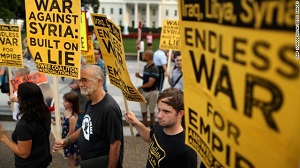Vincent de Ruiter
Staff Writer
On Saturday, 31 August, President Barack Obama announced his support of “military involvement” in the Syrian civil war. Citing State Department reports of evidence that the regime of Basher al-Assad had used chemical weapons against its own citizens, Obama called for military action against the Syrian regime, with congressional approval. But is “going to war” that simple? Can President Obama, commander-in-chief of the world’s largest military just “start a war?” The answer is complex.
According to the “War Power Resolution of 1973,” the president must submit his or her intentions to the United States Congress within 24 hours of proposing military action. United States law allows for the president to use any amount of US military personnel for “military action” for 60 or 90 days having notified Congress of it, but without congressional approval. Most recently, during the Libyan civil war in 2011, President Obama supported the NATO “No-Fly Zone”, without congressional approval. The U.S. Military Mission was officially a “No Boots on the Ground” operation (no ground troops), and was thus deemed a different type of “hostility” than what the War Powers Resolution entailed.
However, this time around President Obama is seeking Congressional approval. This could mean that he plans on being involved in Syria for more than 60 days, engaging in the type of hostilities the War Power Resolution encompasses.
Now that Obama is asking Congress for approval, he must first prove that the military actions are the result of a “national emergency created by attacks upon the US, its territories, its possessions, or its Armed Forces.” Put simply, this means Obama cannot go to war because of “personal conscience.” The proposition, already burdened by the aforementioned problems, would be a hard sell in Congress. Faced with an unwilling electorate and potential political consequences to their careers, many Congressmen are against intervention. Representative Tim Griffin (R-AK), told The New York Times that “it will be an uphill battle for the president to convince me because I think he has handled the entire situation poorly…and frankly I am reluctant to give him the license for war.”
President Obama may find support for involvement in Syria difficult even within his own party. Rep. Walz (DFL-MN) is quoted in the Atlantic magazine as saying “I wish folks were a little more vocal and asking for this, we have a responsibility to the administration before being true to who we are, it [military action in Syria] is about the constitutional responsibility of the house and it should not matter who is the occupant of the White House.”
At the moment, public support in the United States for military involvement in Syria is at the low point. According to a Quinnipiac poll, 60% of Americans oppose any military involvement in Syria, with a mere 9% in favor of any US military aid in the conflict. With the Congress a mere 14 months away from the 2014 midterm elections, Congressmen and women looking to run for re-election will be unlikely to vote for the U.S. to get involved in another “military action.”
With less than two weeks for President Obama to secure backing in Congress, it could go either way. Action is not a guarantee, as a deeply divided and factionalized Congress will face many hurdles to reach an agreement. However, on September 4th the Senate has already voted for a resolution that would allow for a limited intervention. The terms of the intervention include a limit of 60 or 90 days, a prohibition against U.S. troops on Syrian soil, and the ultimate goal of instituting a democracy and ending the conflict.
The House of Representatives, the lower house of the American Congress, has yet to vote on a resolution—and that is where it will become difficult for Obama to exert his will. A war wary American public and reluctant international community would make a Syrian intervention unpopular on most fronts, yet it seems an intervention is in the making.
Vincent de Ruiter, class of 2015, is a Politics and Anthropology major from Minneapolis, Minnesota, United States.

